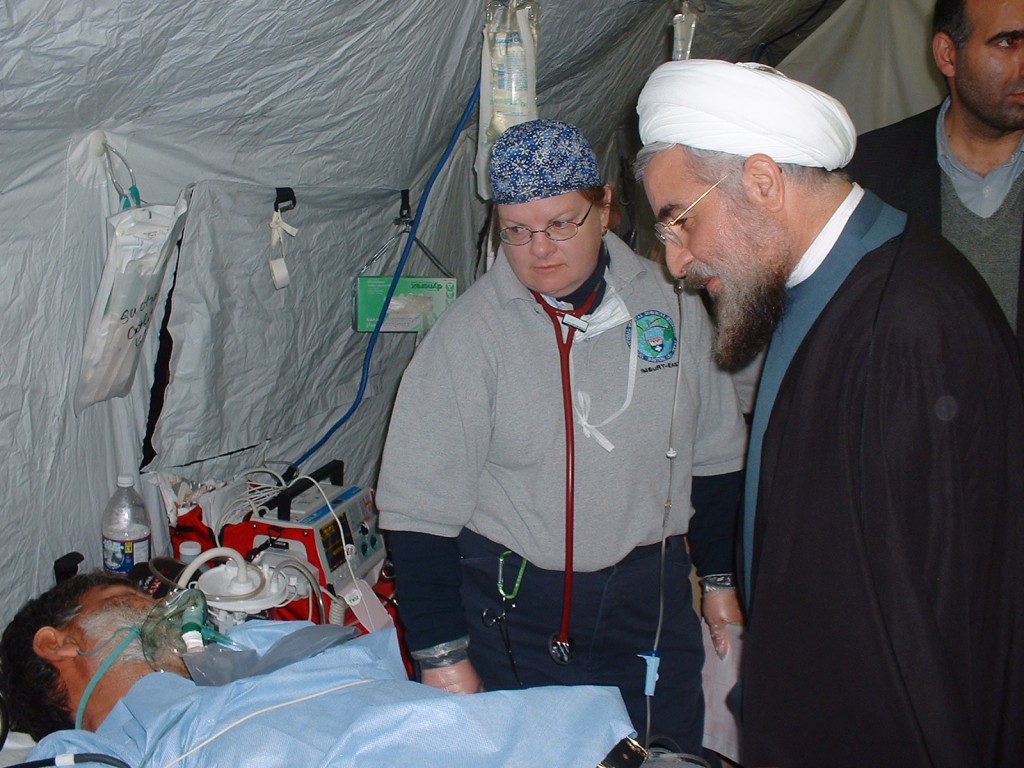
The International Atomic Energy Agency (IAEA) over the weekend reportedly confirmed that Iran has started enriching uranium to the near-weapons-grade level of 60% purity, just days after Iran’s President boasted that they can reach the full weapon’s grade-level of 90% at any time. “We could have done 60% (enrichment) before. Today we can do 90% enrichment if we want to, but we are not seeking a nuclear bomb,” President Hassan Rouhani was quoted by the Fars News Agency as saying last Thursday. Rouhani claimed the advanced stage of nuclear fuel creation is merely a negotiating tactic intended to push the major world powers to halt sanctions and resuscitate the flailing 2015 nuclear accord, known as the Joint Comprehensive Plan of Action (JCPOA).
On Sunday, Iran’s Ambassador to the International Atomic Energy Agency Kazem Qaribabadi told reporters that the IAEA had released a report confirming Iran had reached the 60% enrichment purity level, according to a separate Fars article. The Iranian news agency went on to highlight comments from Vice-Chairman of the Iranian parliament’s Internal Affairs Commission Mohammad Hassan Asafari claiming there are still more “options” for Iran to consider to respond to the world powers besides enriching to 60%.
Meanwhile, a nuclear expert who formerly worked as a chief inspector with the IAEA has pushed back Iran’s timetable on being capable of enriching uranium fuel to nuclear weapon’s grade—but only to a week. Speaking with The New York Times, Olli Heinonen said that Iran could hypothetically reach the critical level of 90% in just a week from the 60% level, whereas previously it would take a full month to make the leap from the lower medical-research level of 20% enrichment.
Despite the dire warning, Heinonen told The New York Times that the leap to 60% is more of a show of force than anything, with the report citing Heinonen and other experts as saying it could take months for Iran to take that weapon-grade fuel and convert it into a nuclear bomb. And that’s not counting the various technological advancements needed to be able to launch it on a missile.
Nonetheless, enriching uranium to the 60% level isn’t subtle—it has no civilian purpose, Heinonen told Israel Hayom in a separate report on Friday. In a post to Twitter, Heinonen responded to a post on the sabotage attack that hit Iran’s Natantz nuclear facility on April 11 by highlighting the intent of Iran’s new enrichment activities. “And the response of Iran? Goes to higher enrichments to remind about hedging and building of latent nuclear weapons capability for a rainy day. You do not need this” for medical purposes, tweeted Heinonen.
The United States, while still looking to negotiate a return to the flawed JCPOA deal with the rest of the group of world powers known as the P5+1, is concerned by the latest Iranian enrichment move. The Americans even said it raises questions about Iran’s sincerity of returning to compliance with the accord.
“We take very seriously its provocative announcement of an intent to begin enriching uranium at 60 percent, and the P5+1 should be unified and united in rejecting that,” said Secretary of State Antony Blinken last Wednesday in comments published by the State Department.
“I have to tell you the step calls into question Iran’s seriousness with regard to the nuclear talks, just as it underscores the imperative of returning to mutual compliance with the JCPOA.”
Blinken believes the JCPOA—which former US President Donald Trump abandoned due to its inability to restrict Iran’s missile program, its openness to eventually reduce nuclear restrictions on Iran and other concerns—“remains the best way to limit Iran’s nuclear program in a lasting way, to verifiably ensure that Iran cannot produce fissile material for a nuclear weapon on short notice.”
Said Blinken, “We’re committed to pursuing that process, but the real question is whether Iran is, and we’ll find out.”
Israel has repeatedly voiced their objections to the JCPOA’s flaws and warned against relying on the deal to prevent Iran from seeking nuclear weapons. With even the JCPOA in tatters and Iran leaping towards nuclear weapons capability, Israeli President Reuven Rivlin leveled a strong warning to Tehran last week.
“These days Iran threatens the peace and stability in the Middle East and in the entire world. It is playing a dangerous game that could lead to a fire that could get out of control,” said Rivlin on Thursday in comments published in an Israeli press release.
“We will not accept threats to destroy Israel and will do everything we can to stop those who wish to harm us.”
(By Joshua Spurlock, www.themideastupdate.com, April 18, 2021)
